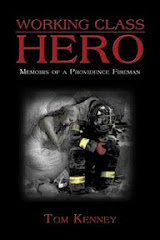Small Fire / Big Potential
The other night we had what turned out to be a relatively small and ordinary fire in a house which was in renovation. At two different points during the fire, however, there was potential for catastrophic consequences – one known and one unknown.
We were dispatched to a reported dwelling fire in the Mt. Pleasant section of the city about 10:00 PM on a clear humid night. When we arrived on the scene of the reported address, we could see no signs of smoke or flame. While we were investigating, a neighbor from across the street, apparently the one who had called 911, approached us saying “mucho fuego” while pointing to the first floor of an unlit home. We looked in through the windows from the street and saw nothing. As we attempted to ask him if he was sure it was this house, he waved his arms in an upward motion, pointed to the house, and said, “Si, si”.
We made our way to the porch to peer into the living room via the front windows. When Tim tried to see into the house the window looked foggy. He attempted to wipe the outside of the window, but quickly pulled his hand back, “The window’s hot, we’ve got a fire in there”, he said. “Go get the line (hoseline)”, I barked. “Engine 15 to Fire Alarm, Code Red, 2-story, wood-frame, occupied, fire on the first floor.”
As Timmy came back with the line, I yelled to Ladder 6 as they pulled up that we needed a ladderman to open up the heavy front door. As Timmy stretched the hoseline to get it into position I told him to stay low and away from the windows. With a fire of this type it is very possible that the heat is building to extreme levels inside the house as the fire (which has already been burning) now smolders due to a lack of oxygen. If the windows break from the high heat and oxygen is introduced to the smoldering fire the result could be explosive – a backdraft.
We crouched together in front of the door as a couple of guys from L-6 began forcing the door. We were staying as low as possible because introducing the oxygen via the open door could have the same type of result. If we stayed low the fire would roll out the door above us.
The door was forced and the heat and thick smoke poured out of the building and enshrouded us on the porch, but no explosion. One potentially serious situation was now over and the incident became more of a routine fire. We made our way into the hallway and then into the living room very quickly and Tim directed the hose stream toward the growing glow to our right. It was hot, smoky and almost completely black. We crawled over debris on the floor and stumbled over furniture strewn about the room as we chased the only visible light in the room, extinguishing the fire before it could get grow to the size it had once been.
As Tim continued to wet and cool the area to avoid any chance of flare-ups I saw a bright glow from the corner of my eye, just about a foot to my left. I began to feel the heat of another area of fire growing quickly right next to us. I tapped Timmy on the left shoulder and yelled through the mask, “Over here, to your left!” He quickly turned to see the new area of fire and attempted to get the hoseline in position to knock it down but the line was caught on something in the dark. As he struggled with the hose we began to hear the fire crackle and pop as it fed on the debris on the floor. When he finally pulled the hoseline free and directed the stream at the fire it quickly darkened down, overpowered by the 125 gpm’s (gallons-per-minute) of water delivered by our line.
Once we had opened the door without incident this had been a relatively ordinary and small fire. Even the flare up of the debris next to us was never anything that was overly worrisome. After we had knocked down the fires we, along with members from other companies, began opening windows allowing the remaining heavy smoke to escape to the outside. The contents and layout of the house began to slowly come into view. It was then evident that this fire had burnt for quite a while before going into hibernation due to the lack of oxygen. The charring of the walls, ceiling and furniture all happened prior to our arrival. We had extinguished the rejuvenated fire before it could do further damage.
All in all this had been a successful operation for us. We had avoided a potentially serious situation and had knocked down the fire with minimal damage. It wasn’t until the fire investigator began to sift through the debris which had been burning about a foot away from Tim and I that he noticed that there was live ammunition scattered throughout the debris – a box of rifle shells and a bunch of loose .38 caliber shells!
The first potentially dangerous situation was avoided by recognizing the signs and properly gaining access to the building. Breaking the windows could have lead to disastrous consequences.
The second potentially dangerous situation was avoided by pure luck!
Thursday, June 12, 2008
Subscribe to:
Comments (Atom)

